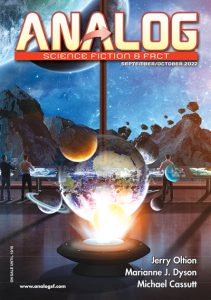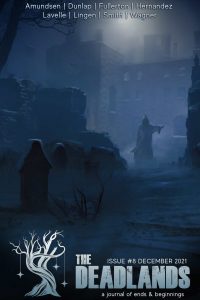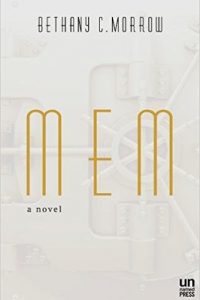Karen Burnham Reviews Short Fiction: Lackington’s and Analog
 Lackington’s Spring ’22
Lackington’s Spring ’22
Analog 7-8/22
With its 25th issue, editor Ranylt Richildis has decided that Lackington’s magazine will close its doors for now. It’s going out with some fireworks, as this issue is stuffed to the gills with excellent stories, many of which reach out to lost times and lost civilizations. Many of them put me in mind of the atmosphere of Lord Dunsany’s works. I don’t usually review every work in an issue, but I couldn’t choose any of these to leave out. The opener, “Before Hand Meant Hand” by Nathan Alling Long features musings from the perspective of a pre-language human and looks at what that understanding would be like when, for instance, there’s no word to separate ‘hand’ from ‘body’ as a whole. R.K. Duncan provides “Eat the World”, about Nim, member of an agricultural tribe whose masks embody benevolent gods of the harvest. When members of a neighboring tribe approach wearing hunting masks, threatening both herds and humans, Nim runs for the mask of Never-Full, a god that is much more dangerous. Nim and the god fuse as they suck the life out of almost everything in their path on their way to defeating the invaders. The description of the feeling of merging, of the struggle for control between the god and Nim and the fluid boundary between them, is intense. Also intense is the world of “The Ercildoun Accord” by Steve Toase. The narrator is an archaeologist attempting to identify human remains in the land of Faery as described by Robert Kirk – folklore in our world, documentary in this one. The premise is played seriously, never for laughs. The landscape is surreal and the threats capricious and deadly. There’s not much chance for a happy ending here.
“The Surface of Water” by Alexandra Munck is about Paul, a STEM kid who receives a book on dragons. In this world they evolved a sophisticated civilization alongside the dinosaurs but were wiped out in the same extinction event. Paul would rather do math, but the book is a connection to his father who died young. Aga, a dragon godqueen, appears to him in a dream. She needs him for a quest, and through that journey there are musings on Death, riddles, and strange comforts. I have a soft spot for imaginary reference works, and “The Atlas of Wandering Bones” by Kaitlin Tremblay fits the bill. It describes different pieces of a human skeleton that existed and scattered its bones long before humans existed, the strange places the bones wind up, and the strange plots they may be involved with – especially the Teeth. The monstrous is not confined to monsters in either “In the Stillness of Bone and Sea” by KT Bryski or in “Something Monstrous Lives in the Oceans” by Alexandra Seidel. Bryski’s story is set in the Royal Ontario Museum, where Megan’s dad works. His two daughters have the run of the place while he tries to work and they’re out of school. They’ve lost their mother and are each dealing with their grief differently. The older sister has developed an eating disorder, and Megan starts talking with the life-size model Mosasaur, attempting to become half dinosaur herself. Sometimes you have to go through the dark parts before you can move forward. In Seidel’s story the narrator is the sole survivor of a colony on alien planet, Valenga. After the loss of all other humans to a fungal infection, this mycologist goes to make contact with the sea monster in the ocean. Communication is first established by mimicry and evolves from there. Monstrous is a word with many layers, and many of those layers are sliced through here.
“The Scribe’s Lament” by Bindia Persaud is a beautiful tale of a bedraggled stranger who arrives in a small village. He’s a refugee from the now destroyed City. He’s willing to work, and eventually falls in love with Elutil, our narrator and a gifted storyteller of her people. There’s a secret that he’s hiding, and she is too wise to try to force it from him, but eventually his letters and her stories might be a path forward to healing. It is a quiet story of wisdom.
Closing out the issue is “Homage to Stone” by Thomas Canfield. Banai goes on a quest, starting from his home in green swamplands, across desert and into mountains. He hopes to reconnect with the remains of an ancient king and ancient stone and bronze, materials lost to his current people. The echoes of his journey will spread far and wide, as will the stories that Lackington’s has brought us over the last eight years.
Language and communication are front and center in a few of the stories in the July/August issue of Analog. In “In Translation (Lost/Found)” by Kelsey Hutton is a great interrogation of how “universal translator” technology might impact society and individuals. Simone is Métis on a spaceship that is part of a flotilla leaving Earth. Subtle things start going wrong, including her embedded translator. All of a sudden she can’t understand what anyone around her is saying, and she has to start learning new languages, including her own native tongue, from scratch. In the background there is a science fictional problem that needs solving, but it is Simone’s emotional journey of being doubly cut off from community – by losing access to the universal comms system and by not being able to speak her native language fluently – that takes the foreground. Then in “Everyone Then Who Hears These Words” by Aimee Ogden, we have an alternate history where Dr. Masson has found a way to amplify the extremely faint sound waves that still reverberate through time. Through meticulous work with his Indian colleague M. Dhar, they are able to isolate and hear sounds going farther and farther back in time. Masson, a deeply religious man, hopes to hear the words of Jesus – Dhar has other motivations. Their work is interrupted by WWII, but they are able to reunite afterwards. The pacing and scope here are well done. Finally in “We May Be Better Strangers” by Mjke Wood, a generation starship has left Earth well behind and hasn’t received any communication from the home planet in years. Amazingly they pass close enough to another flotilla of ships, headed the other way, to detect them. They may have a chance to exchange one message before they are once again alone in space. What should they say – should they warn these travelers away from ruined Earth? – and how should they say it? There’s an interesting social structure on board the ship, where the captain is usually contentedly farming unless called up by unusual circumstances. One doesn’t read about too many happy generation ships these days.
Elsewhere we learn more about adventures of the Tohrroid in “Punctuated Equilibrium”, a novelette by Auston Habershaw. After we saw it last (in the May/June issue), it had settled on a planet and, after failing to blend in as a mobile creature, has now made a home for itself disguised as a pond lily. Not too exciting, but the dead bodies thrown in the water every few days more than make up for it. The owner of the estate is Amoth, a cruel man. People can challenge him to a duel, but they never win, leaving plenty for our hero to eat. Its cover is blown after it thwarts an assassination attempt, and it must decide which side to take after it realizes it can’t go back to being a well-fed water plant. I continue to enjoy the first-person narrator’s voice in these stories. Jerry Oltion’s novelette “The Dark Ages” is a love letter to amateur astronomy. Jovan is from our future and tries to find the darkest skies he can – which isn’t much, even in the Arctic. He takes to time travel to try to find truly dark skies – and a time where nothing will immediately try to kill him. He ends up at a star party in Oregon close to our time, and finds not just darkness but a community as well. I feel like Jovan didn’t adequately explore ancient desert environments like the Mojave or Sahara, but this story is honestly and warmly more about the people than it is about specific stargazing sites. Another impactful novelette (this issue has one novella and five novelettes) is “The Mercy of the Sandsea” by T.L. Huchu. It is a sobering story about Panganai, a veteran of a squad of soldiers since dishonorably disbanded. On a world where the sand is so fine it breaks in waves like the ocean and will fill your lungs with cement if your filter system is breached, he sees one of his old comrades – and sees an agent of vengeance kill him while reciting a seemingly never-ending list of names and ages. As the story unfolds, we learn about Panganai’s history, and it’s not a simple one. The sandsea provides a menacing backdrop to the drama.
This review and more like it in the Sepetmber 2022 issue of Locus.
 While you are here, please take a moment to support Locus with a one-time or recurring donation. We rely on reader donations to keep the magazine and site going, and would like to keep the site paywall free, but WE NEED YOUR FINANCIAL SUPPORT to continue quality coverage of the science fiction and fantasy field.
While you are here, please take a moment to support Locus with a one-time or recurring donation. We rely on reader donations to keep the magazine and site going, and would like to keep the site paywall free, but WE NEED YOUR FINANCIAL SUPPORT to continue quality coverage of the science fiction and fantasy field.
©Locus Magazine. Copyrighted material may not be republished without permission of LSFF.






